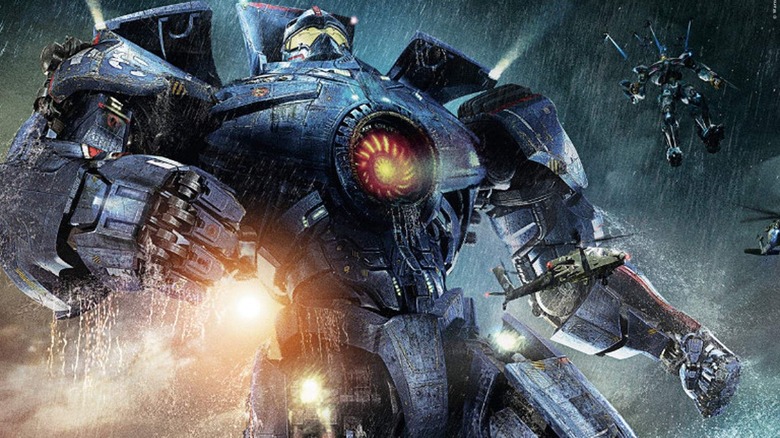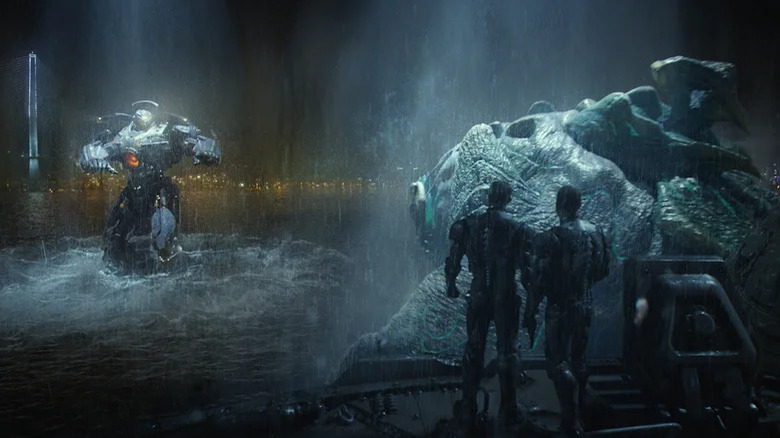Why Pacific Rim Terrified Director Guillermo Del Toro Like Never Before
Guillermo del Toro's "Pacific Rim" remains one of the very best live-action films inspired by anime that wasn't actually based on anime (though it eventually became one). The 2013 movie is essentially about giant robots fighting kaiju. Its influences are many, from kaiju movies like "Godzilla" and the work of Ray Harryhausen, but also clearly tokusatsu like del Toro's beloved "Ultraman" and even mecha anime like "Gunbuster," "Getter Robo," and "Mazinger Z."
"Pacific Rim," arguably more so than "The Matrix," feels like the biggest American movie inspired by anime, a movie made by someone who loves the medium, at a time when anime was starting to enter the mainstream. But if you asked Guillermo del Toro that question shortly before the release of the film, it seems he would have been a nervous wreck.
David S. Cohen's book "Pacific Rim: Man, Machines & Monsters — The Inner Workings of an Epic Film" describes the moments before the debut of the first trailer for "Pacific Rim" at San Diego Comic-Con, when del Toro was "struck by a sudden attack of nerves," which was new for the director. After all, the Comic-Con contingent is typically fans of his work, and a big movie about giant robots fighting giant monsters seems like a no-brainer for Hall H. "It hit me like a ton of bricks," he recalls in the book. "I grabbed my wife and I said 'I'm absolutely petrified.'"
Looking back, it makes sense that the eventual Oscar-winning director would put so much pressure on "Pacific Rim." You have to remember that this was the first film del Toro had directed in five years at that point. In the time between "Hellboy II: The Golden Army" and "Pacific Rim," del Toro famously spent two years developing an adaptation of "The Hobbit" and also "At the Mountains of Madness," neither of which materialized. All eyes were on "Pacific Rim," and it had to deliver.
A film of personal importance
As mainstream popular as anime shows were starting to become in 2012 when the first trailer for "Pacific Rim" was released, it wasn't enough to dissuade the public that the movie wasn't just another "Transformers." After all, the movie came out before the "Godzilla" reboot, and just after "Transformers: Dark of the Moon." Del Toro needed this movie to be a success to win over the general public, because it was the first time he had made something of this scale. "Rarely has a movie been more important for me personally," he says in the book. "Not since 'Cronos,' or maybe 'Pan's Labyrinth,' has a movie been that important."
Indeed, "Pacific Rim" was del Toro's first truly original work since 2006's "Pan's Labyrinth." It was his first original English-language script, as he transitioned fully into a Hollywood director. In Cohen's book, del Toro expresses concern that the Hall H crowd would judge "Pacific Rim" harshly because of the movies he hadn't made since last he was at the convention. The book describes "Pacific Rim" as a tonic for del Toro, a project that could and did restore in him the pleasure of making and watching movies. Exercising creative freedom was restorative for him.
But it was also a blockbuster movie meant for all audiences. Where "Hellboy" and "Blade II" were made at a time when comic book movies were bigger gambles, "Pacific Rim" was the first time del Toro played in the big leagues of mainstream summer entertainment. The movie was released just a month after Zack Snyder's "Man of Steel" and shortly before James Mangold's "The Wolverine." Unfortunately, the film wasn't as big a hit as it should have been. Though it did get a sequel, it did so without del Toro's involvement — the anime did, however, include his wish for a human-kaiju hybrid.

